FOR A PEDAGOGY OF TRANSFORMATION
ENSAP Lille
‘School began with a man under a tree; he didn’t know he was a teacher, discussing his ideas with people who didn’t know they were pupils.’
Louis I. Kahn
‘All design has a purpose. Only our questions change. We no longer ask “what does it look like?” or “how does it work?”, but “how does it relate?”.’
Victor Papanek
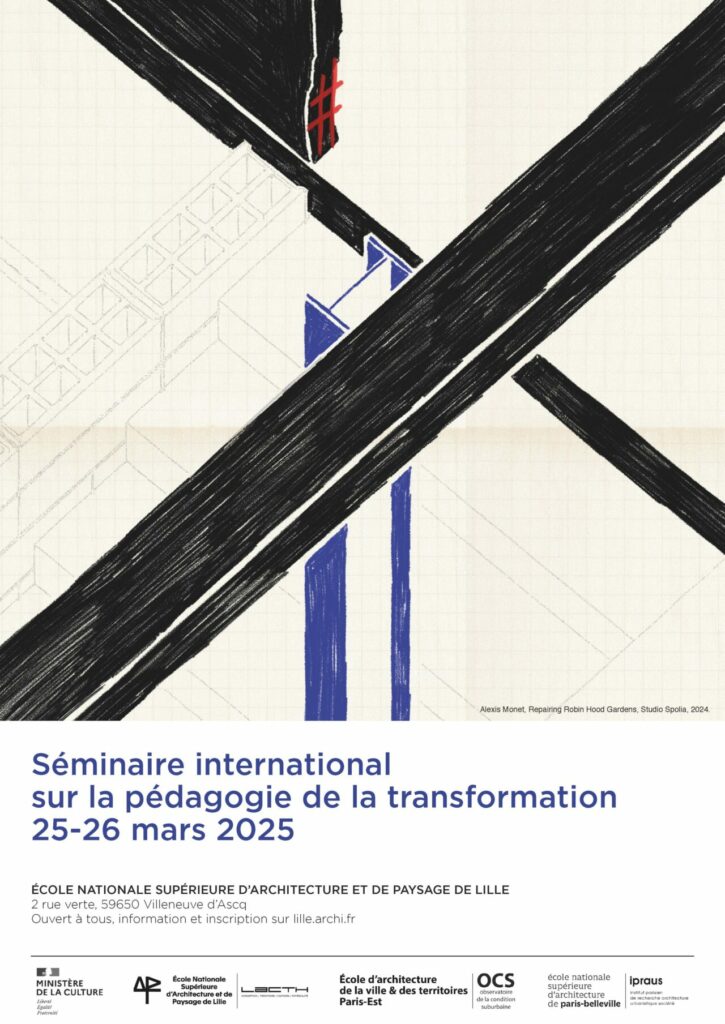
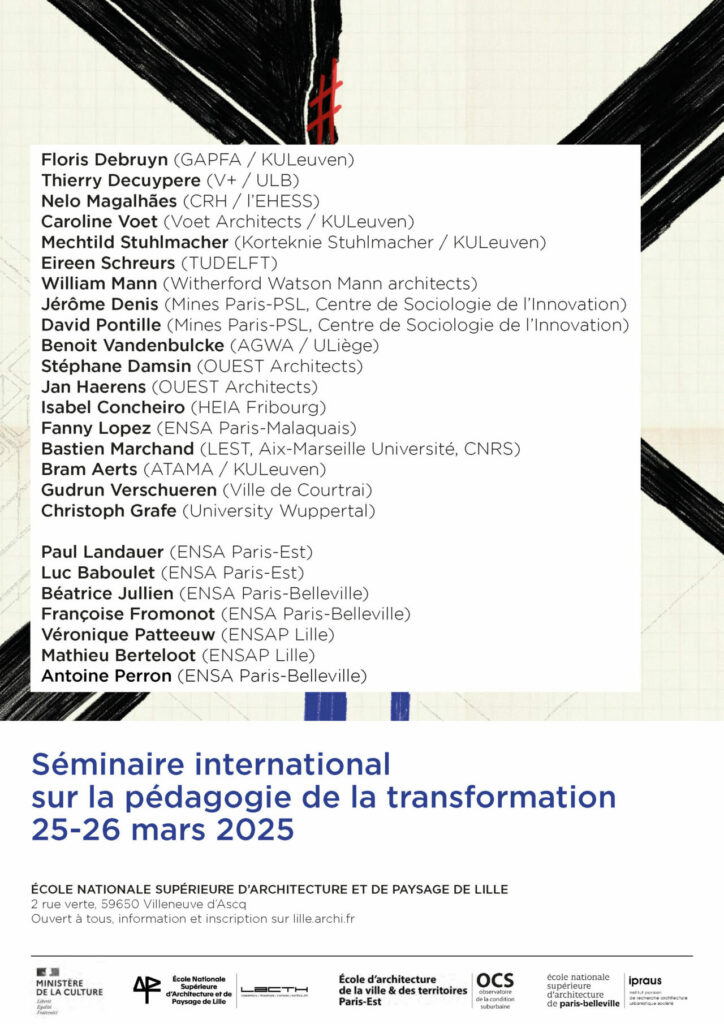
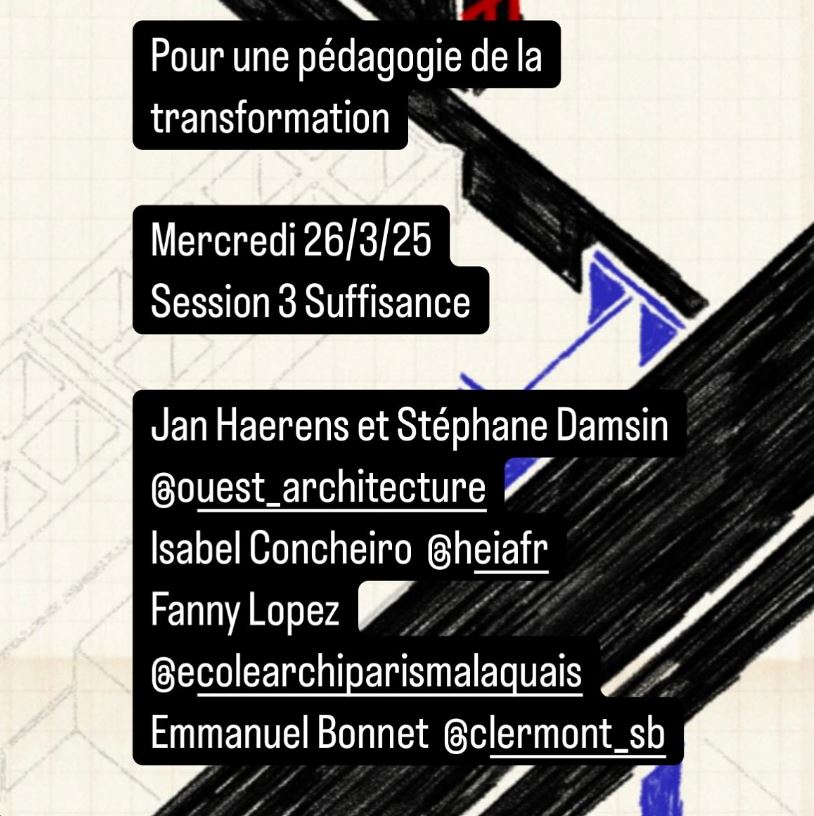
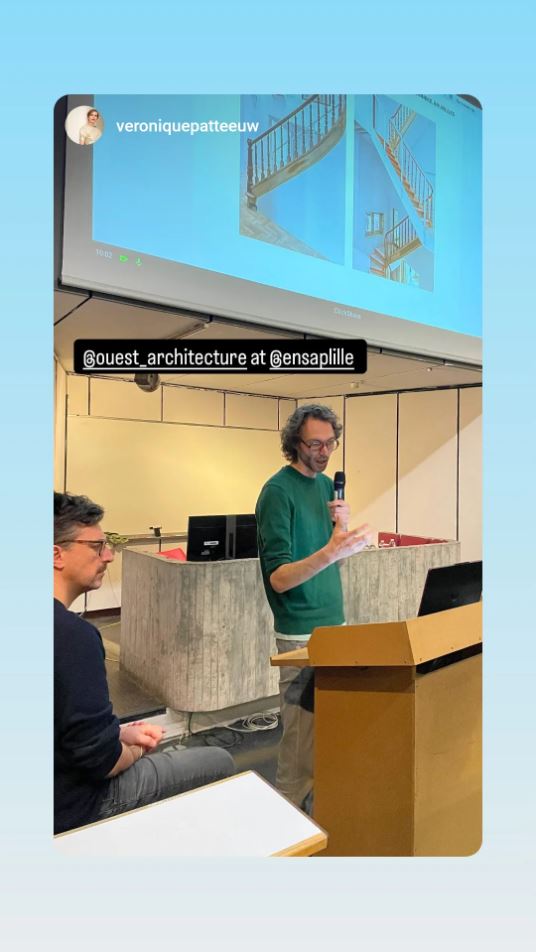
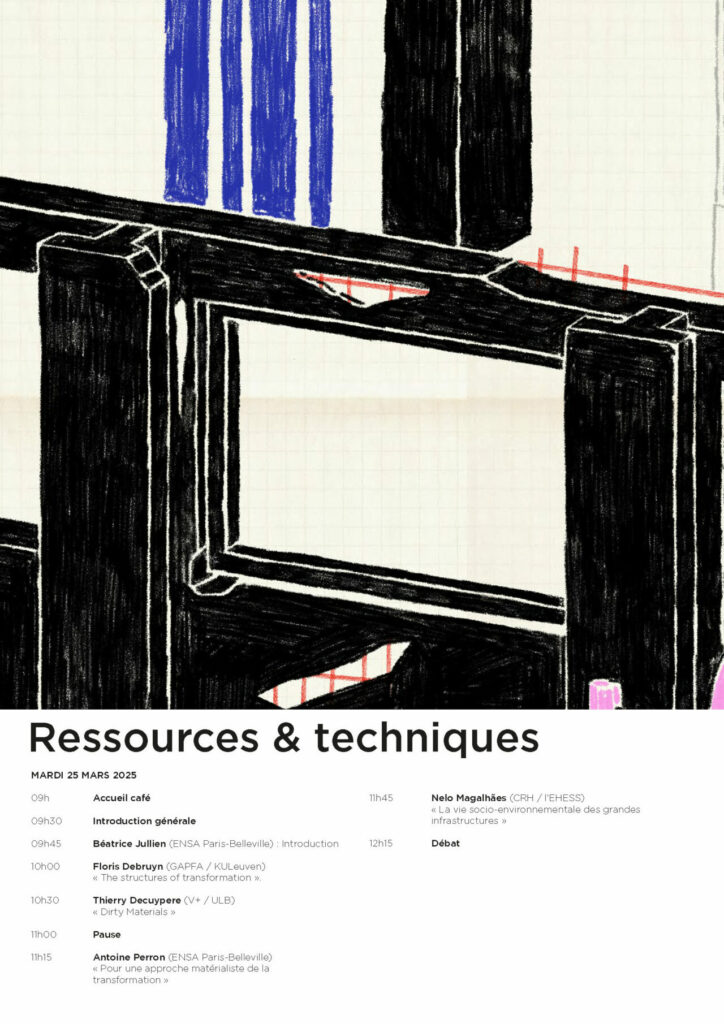
This session will focus on the specific material and technical choices induced by the transformative perspective:
– A critical analysis of the use of materials and the techniques used to implement them, so as to combine knowledge of their implementation and performance with a heightened awareness of their environmental impact (supply chains, production methods, ‘reciprocal landscapes’, etc.),
– The relationship between the singular and the typical, since each transformation situation, singular by nature, is at the same time typical of an era, a culture and a tradition whose characteristics it is important to understand,
– Technical hybridity, since transformation implies the use of heterogeneous constructive systems whose static behavior, not known in advance, requires a rethinking of construction techniques, regulations and standards,
– Pre-project appraisal techniques, in order to develop the ability to assess the constructive and programmatic transformability of the buildings or situations encountered,
– Finally, a broader questioning may concern, on the one hand, a critical analysis of the structures that administer (politics), regulate (norms), finance (economy) and transmit (pedagogy) the current extractivist, productivist and consumerist model, and on the other hand, the means to change this model, and secondly, as well as a review of initiatives already working towards this goal.
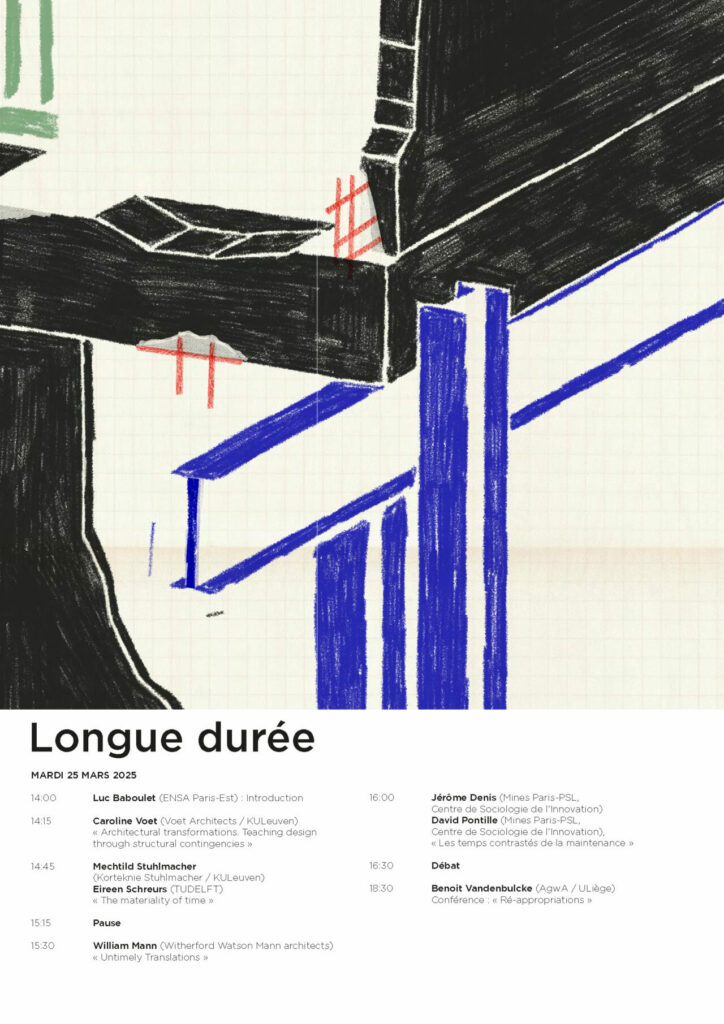
In this session, we’ll be looking at the capacity of resources and of the technical systems that implement them to establish themselves over the long-term:
– the impact, on ecosystems and Earth system cycles, of the technical systems born of the industrial revolution that condition the current practice of architecture, generally based on material and energy resources whose stocks seemed unlimited at the time,
– a critical analysis of the negative externalities induced by their use: depletion of those stocks, costs and nuisances linked to their exploitation, as well as to the transformation and transport of materials,
– the reciprocal exploration of materials and of manufacturing, implementation and operating processes likely to last without depleting the resources they require,
– the corollary exploration of material and technical alternatives: so-called “appropriate” or non-standard technologies that mobilize short operating chains and localized circuits that respect cultural traditions – or, more generally, the possibility of a re-territorialization of and through architecture.
– the development of caring techniques, supported by the formation of a culture of ageing, maintenance and reparability.
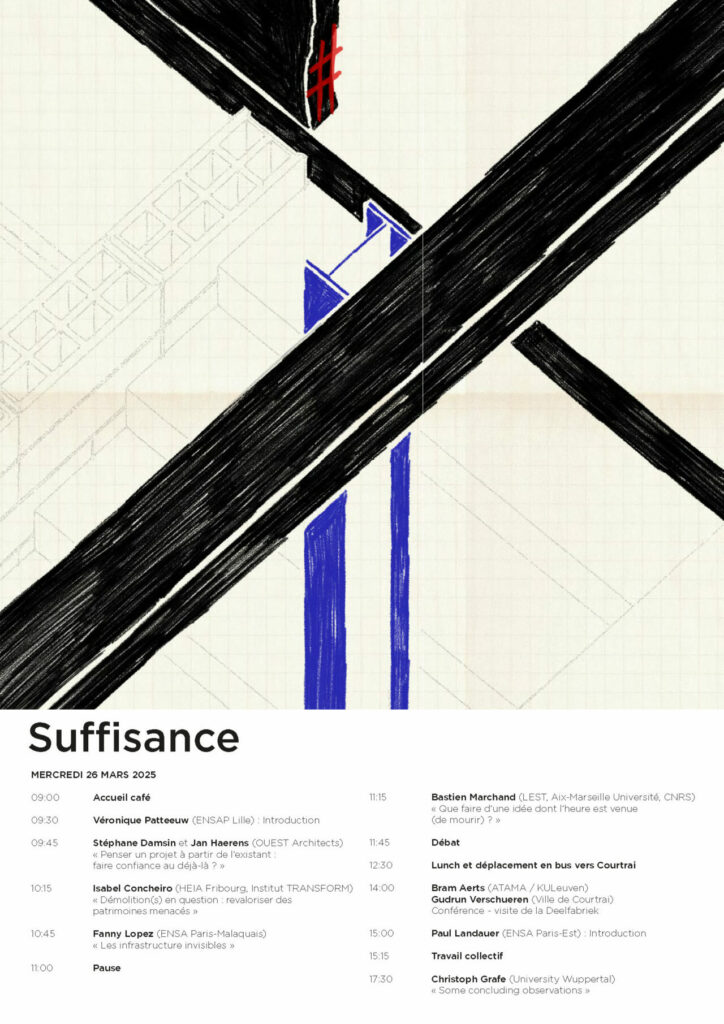
For an economy of sufficiency – as opposed to efficiency – the notion of well-being is not based on the accumulation of commodities. This means freeing ourselves from the self-accelerating grip of productivity by questioning standards of comfort, the consumerist model and, more broadly, the principle of abundance. In such a perspective, the workings of industries and the tasks of institutions are reversed: rather than insisting on scarcity in order to promote products that are ever more numerous and efficient, but ever more quickly replaceable and less repairable, the aim is to seek agreement on the level of goods that a majority, within a given population, is likely to consider sufficient. Since architecture is, of course, primarily concerned, this session will look at the conditions for such an agreement (energy and material consumption, standards of use and comfort), the means of achieving it (the development of ‘commons’, the alternative organization of architectural production, but also the voluntary renunciation of certain resources or practices), and of course ways of developing a sufficiency didactics within both the academic world and civil society.
FOR A PEDAGOGY OF TRANSFORMATION
ENSAP Lille
Year: 2025
Location: Lille, France
The exponential power of industrial civilisation has, over the past two centuries, brought us to the point where most of the processes that maintained a relative equilibrium within the Earth system have ceased to function. So much so, that a new principle is emerging in all fields, which calls on the arts, sciences and techniques to ‘repair this world’ rather than (eco)rebuild another: as the report of the Club of Rome already stressed in its day, it’s less a question of increasing production than of reclaiming what is already produced.
Given their strong involvement in this state of affairs, the discipline and profession of architecture, urban planning and landscape design are particularly concerned. Beyond simply adapting to the doxa of ‘transition’, such a perspective requires a profound aggiornamento on their part: a rethinking of habits, practices and notions (among these: the notions of heritage, authorship, oeuvre and project, the historical narrative of architecture and its relationship with time… ); a broader reference canon, since ecological emergency, global but unevenly caused and suffered, requires both its de-centering (a non-eurocentric vision) and the re-embedding of architecture in the physical and living world as a whole (a non-anthropocentric vision); finally, a critical assessment of the institutional apparatuses (administrative, political, financial, professional… ) that condition the nature and functioning of the current model, in order to make it evolve by acting at the level of the institutions that ensure its transmission.
A PEDAGOGY OF TRANSFORMATION / TRANSFORMING PEDAGOGY
It seems to us, indeed, that a genuine culture of transformation will not develop unless the corresponding tools are developed: such is the vocation of Trans/Form, an open international network of European educational initiatives (masters) specifically dedicated to the pedagogy of transformation. It aims to be a forum for exchange, capable in its modest way of contributing to the evolution of this powerful system of activity that is architecture, understood in the broadest sense. It strives to develop critical awareness of current issues, the progressive elaboration of alternative thinking and practices, and the development of concrete tools (theoretical, methodological, technical and cultural) capable of fostering the emergence and education of a new generation of ingenious transformers.